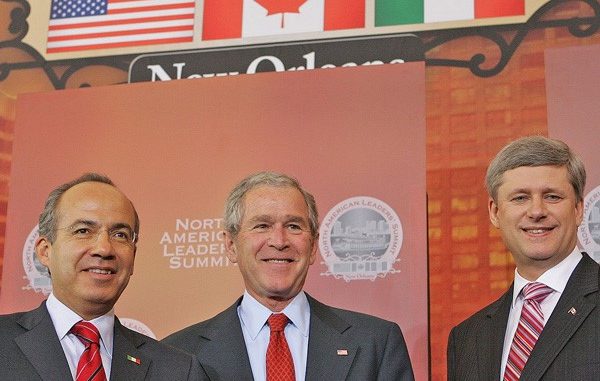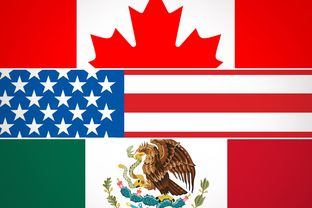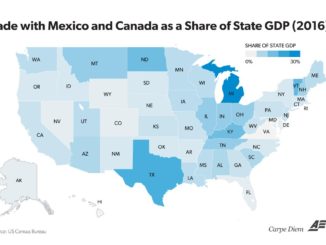
By Felipe Calderon
Days into his presidency, Donald Trump’s decisions have opened confrontations on several fronts and confirmed our fears: not only is he a threat to international trade and global growth, but also to the international order, the environment, racial and religious minorities, Nato, the UN and a long et cetera.
Unfortunately, President Trump has shown a special interest in abusively hitting Mexico, knowing that there is a huge asymmetry between our countries. As long as he believes that “every nation” has been taking advantage of the US, Mr Trump’s attitude towards Mexico — threatening, insulting, with an intent to humiliate — points to a potential pattern. How should other countries react?
Mr Trump has argued that the North American Free Trade Agreement is unfair because there is a trade deficit for the US. The accusation is absurd and reveals a misunderstanding of basic macroeconomic concepts. This protectionist theme is reminiscent of the worst demagogic regimes in Latin America and their failures. Mr Trump ignores how successful Nafta has been for the US and the whole North America region.
Indeed, the Mexican and the US economies are complementary. This has led to highly integrated value chains: products worth $1.5bn cross the border each day. Mexico is the second-largest buyer of American goods at almost $250bn in 2015 — more than twice as much as China and roughly the same as the whole EU, including the UK. American exports to Mexico — which have grown 7 per cent a year on average — directly support an estimated 1.1m American jobs, and 6m depend on bilateral trade. Forty per cent of the value of the final goods exported from Mexico to the US is added in the latter. This integration is precisely why North America is one of the most dynamic regions in the world.
Nafta has been an engine of growth on both sides of the border: sabotaging Mexico’s economy cannot contribute to regional development. Further, the more jobs Mr Trump destroys in Mexico, the more immigrants he will attract.
Building a wall between two countries that are neighbors, partners and supposed allies, is a hostile act itself. We have come to learn, after several decades, that such ideas are both expensive and useless. Over 1,000km of barriers have already been built and there are huge technical, environmental and legal obstacles to finishing the barricade.
Besides, net immigration of Mexican workers into the US fell to zero in 2010 and is currently negative. Obviously, nobody wants to pay for such a project. Hence Mr Trump came up with the ridiculous proposal that Mexico should do so.
The entire Mexican people (and a large number of Americans) refuse to accept such a senseless idea. Where in the world and under which law is it acceptable that, if your neighbour builds anything on his land, you must pay? Mexico will not let this abuse pass.
We must defend ourselves legally, diplomatically, economically and politically. There are legal tools under international law, both in Nafta and the World Trade Organization, and under American laws, which Mexico could use to fight back. Part of the greatness of the US lies in the rule of law.
Already its judges are demonstrating what that means — even for the nation’s foremost individual. Also, in the US hundreds of automotive, retail, agricultural and other exporting companies are organizing to oppose import tariffs and restrictions on trade with Mexico as these measures would raise prices for American consumers and would wipe out US producers from competing globally.
The likely outcome of renegotiating Nafta would be very negative to Mexico. So there should be no such renegotiation. But if Mexico is forced to the table, it should open up the entire bilateral relationship — namely security, the fight against organized crime and drug-trafficking, transit migration and intelligence co-operation. President Trump’s team needs to understand that the US should not take Mexico for granted. It cannot afford to lose its southern neighbor, a vital ally in many aspects for the US.
International co-operation is essential. Beyond the senseless wall and its funding, there is much more at stake. The foundations on which modern civilization is built are themselves at risk: freedom, respect among nations, the rule of law, democracy, free trade and economic liberty, all of which are essential to boost growth. Mexico will resist, but needs support and solidarity in its defense of liberal values. They are being challenged by the most powerful politician on earth.
Felipe Calderon was president of Mexico from 2006 to 2012.



